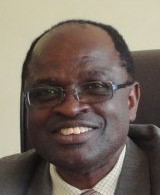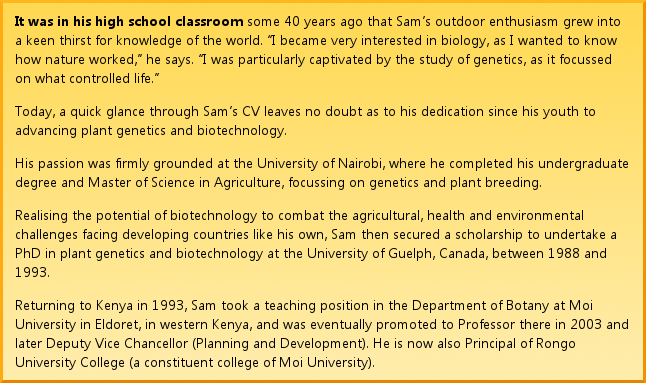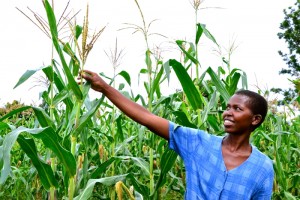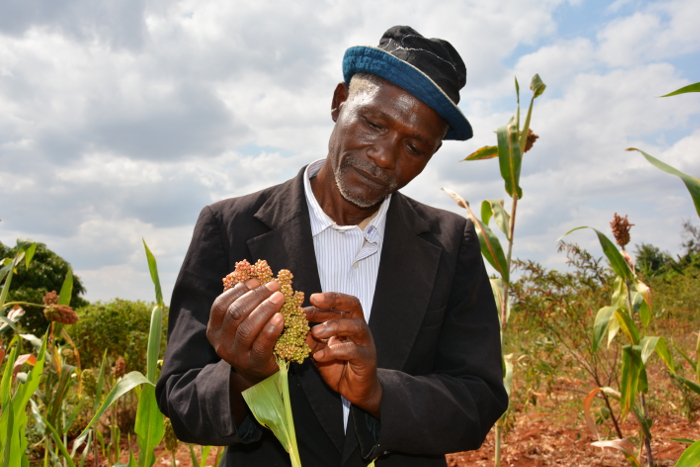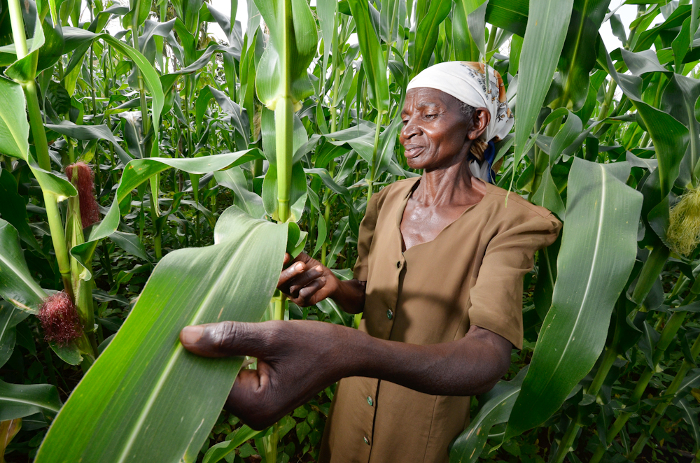Kenyan crop scientist Samuel (Sam) Gudu loves nothing more than getting his hands dirty out on the land.

Seeing the true impact of research and doing what he likes to do best: Sam in a maize field in Kenya.
“Although these days I spend most of my time inside doing administrative work, I go out to the field at least once a month, as this is the only way I can truly see how our research is helping to make the lives of Kenyan farmers a lot more profitable and sustainable,” he says.
A love for the land began in Sam’s childhood on the banks of Lake Victoria in western Kenya, where he learnt the value of “hard and honest” work and a sense of responsibility for the welfare of his community.
“Growing up in a small fishing village, I was always helping my parents to fish and garden, or my grandparents to muster cattle. I remember spending long hours before and after school either on the lake or in the field helping to catch, harvest and produce enough food to eat and support our family,” he says.
Sam and GCP embrace biotechnology and emerging scientists
Sam’s relationship with the CGIAR Generation Challenge Programme (GCP) began in 2009 via a series of collaborative projects to advance maize and sorghum genetics for acid soils. Along with some of his students at Moi University, he worked primarily with researchers at the Brazilian Corporation of Agricultural Research (EMBRAPA), Cornell University in the USA and Niger’s Institut National de la Recherche Agronomique du Niger.
To take the example of maize, the challenge they face is that small-scale farms across Kenya yield less than one tonne per hectare, and this figure is declining. This compares with a possible yield of five to eight tonnes under controlled research conditions. Constraints to maize production in Kenya are threefold: soil acidity and poor fertility, pests and diseases, and frequent droughts.
Through GCP, Sam was also able to work with senior researchers at the International Rice Research Institute in The Philippines, the International Crops Research Institute for the Semi-Arid Tropics in India and the Japan International Research Center for Agricultural Sciences.
“Collaborating with these advanced colleagues in their advanced labs has enabled us to develop [breeding] materials much faster,” says Sam, talking about the virtues of improved breeding efficiency in delivering new and improved crop varieties more quickly and ultimately benefitting farmers sooner. “I can see that post-GCP we will still want to communicate and interact with these colleagues to enable us to continue to identify molecular materials that we discover.”
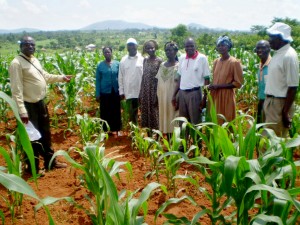
Sam (left) addressing a mixed group of farmers and researchers at Sega, Western Kenya, in June 2009.
Both EMBRAPA and Cornell University hosted several of Sam’s PhD students as part of GCP-supported research. “These students are now returning to Kenya with a far greater understanding of molecular breeding, which they are then sharing with us to advance our national breeding programme,” says Sam.
In parallel to his own career progression, Sam has been a strong proponent for promoting the next generation of Kenyan scientists. He has recruited many talented graduates in plant genetics, plant breeding, molecular and cell biology and biotechnology. He has also been instrumental in sourcing advanced laboratory equipment for research labs in Kenya that enable practical teaching and research in molecular biology.
“The Kenyan Government recently increased its funding for science and research,” explains Sam. “GCP has also made considerable investment into field research infrastructure. This support has not only helped us compete in the world of research but has also helped raise the profile of science as a career in this country.”
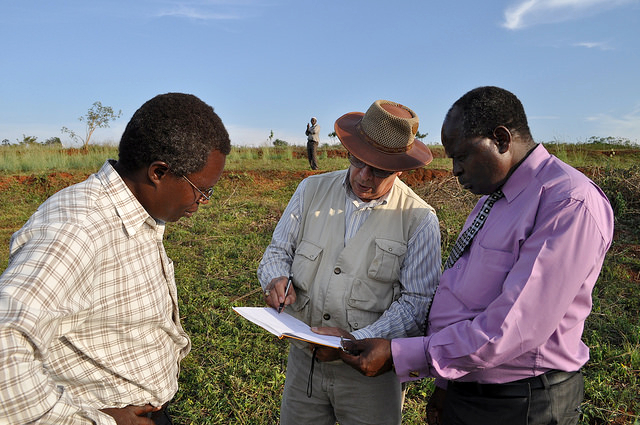
Sam Gudu (right) consults with Onkware Augustino (left) and Hannibal Muhtar (centre, who was contracted to work with GCP partners in planning and implementing infrastructure improvement) at the Sega phenotyping site in Western Kenya in February 2010. Field infrastructure improvements to the site were funded by GCP and implemented by its Integrated Breeding Platform, and included drip irrigation, fencing and a weather station.
The importance of supporting emerging scientists in Africa cannot be overstated, explains Sam. In fact, he considers the greatest achievements of his own career to be those that have benefitted his students, as well as Kenyan farmers.
“I wouldn’t be where I am now were it not for all the assistance I received from my teachers, lecturers and supervisors,” he says. “So I’ve always tried my best to give the same assistance to my students. It’s been hard work but very rewarding, especially when you see them graduate to become peers and colleagues.
“Having funding to support PhD students and provide them with the resources they need to complete their research is very fulfilling, and GCP has provided the funds for a number of my students. This support will go a long way to enhance the long-term success of our goal: to provide Kenyan farmers with cereal varieties that will improve their yields and make their livelihoods more secure and sustainable.”
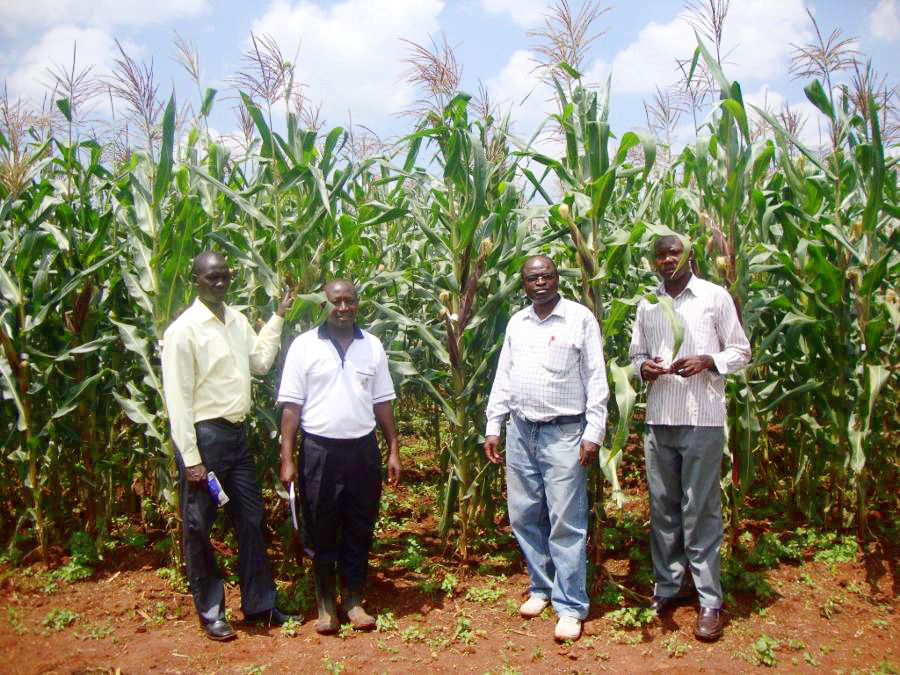
Sam (second from right), with some of his young charges: Thomas Matonyei (far left), Edward Saina (second from left) and Evans Ouma (far right).
Sam and GCP exchange strengths
Sam’s work on improving maize and sorghum tolerance to acid soils, supported by GCP, is already having a positive impact. In sorghum, his team have developed five lines highly adapted to acid soils, which are currently undergoing registration for release as new varieties by the Kenyan national variety release authority. In maize, they have developed eight aluminium-tolerant lines and seven phosphorus-efficient lines.
Sam’s team share their results and materials with their partners across countries and continents. He says these lines will provide sorghum and maize breeders working in other African countries that have acid soils – including Ethiopia, Kenya, Niger, South Africa and Tanzania – with new breeding germplasm, which they can use to breed higher yielding maize and sorghum varieties for their countries’ farmers.
“Knowing which genes are responsible for aluminium tolerance and phosphorus efficiency has allowed us to more precisely select for this in our breeding programmes, reducing the time it takes to breed varieties with improved yields in acid soils without the use of costly inputs such as lime or fertiliser,” Sam explains.
“This means being able to select for, and breed, new maize varieties faster – varieties that are suitable not only for Kenyan soils, but also for other African countries.
“No one else has worked on this before in Kenya. It makes me feel that we’re truly contributing to food security for Kenyan people.”
While Sam has attracted externally funded competitive research projects throughout his career, it was the international collaborative nature of GCP that gave Sam something a little more personal: “I have improved how to communicate, how to develop relationships, how to maintain friendships. I think I have developed much more with GCP because I had many people to communicate with and I had the opportunity to visit other labs.
“GCP has not only developed my professional career but has also allowed me to interact with labs – and people – that I would probably not have interacted with.”
More links
- Right here on the Sunset Blog, discover the full story of sister genes, acid soils and comparative genomics
- Read our profile of ‘Super Sam’, or all about the collaborations he’s been involved in, on the regular GCP Blog
- All about infrastructure improvements on the GCP Blog: extended version | short version
- The project on aluminium tolerance and phosphorus efficiency in maize led by Sam
- Comparative Genomics Blogposts | Research Initiative | InfoCentre
- View Sam’s project update presentation on his work in maize, given at GCP’s 2013 General Research Meeting (on SlideShare)








